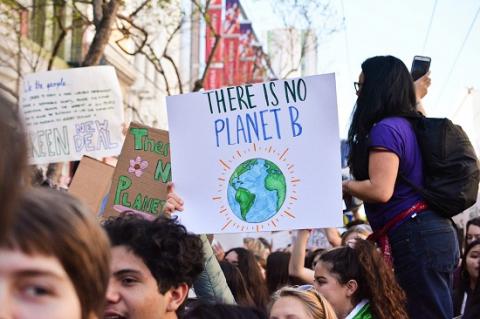
A TV Program to Promote Climate Solutions
Two esteemed members of the Sorbonne University community, Georges Leclere and Luc Abbadie, speak about their involvement in the exciting new TV project that will take on climate change and megacities.
At the UNESCO International WaterMega Conference, from January 11 to 13, Georges Leclere announced the creation of a television program to encourage citizens of megacities to find solutions to climate change. Leclere is a media and television professional, as well as very committed alumnus of Sorbonne University and an active participant in the New York Alumni Club. Luc Abbadie, director of the Institute for Environmental Transition (ITE) at Sorbonne University, also spoke at the conference as a representative and future partner of this unique project.
Here, both Leclere and Abbadie answer our questions about the project.
You participated in the EauMega conference on water, megacities and global change, organized by UNESCO on January 12. Can you tell us more about it?
Georges Leclere: With Ilan Juran, a professor at New York University, we announced the creation of a television program to encourage citizens, students, researchers, and international economic and political partners to invent solutions to the challenges of water conservation and climate change. Our round table, organized within the framework of the Megacities Alliance for Water and Climate for Europe and North America1, brought together actors from megacities, industry, media, politics and research, including Luc Abbadie from Sorbonne University. These experts will be invited to participate in the working group for the design of the pilot project.
Tell us about the genesis and ambition of this TV program.
George Leclere: Ilan and I asked ourselves how to include the younger generations in this issue. We must give a voice to those who will be the main actors of this upheaval!
I have been working in the TV industry for years, so I proposed this idea of a TV hackathon.
In New York alone, the rising waters could be catastrophic if no one takes the problem head on... We want to bring about new solutions to help civil society adapt to climate change, whether it is related to water, food or socio-cultural upheaval.
In concrete terms, how do you imagine this TV program?
Georges Leclere: Our idea is to put candidates from two megacities like Paris and New York in competition. They will come from schools, universities, start-ups, architectural firms, non-profit organizations.... They will have to propose concrete solutions to a major environmental problem affecting their city. They will be accompanied by mentors and selected by a jury, all of whom are researchers, entrepreneurs and others. They will then be filmed and streamed on our special channel. We envision that the "winners" will receive prizes at galas organized after the competition, including scholarships and internships for university candidates, or innovation contracts for start-ups. This streaming operation is essential to motivate the winners, providing visibility for their solutions and revenue from broadcasts on the international market.
Before the start of the competition, we also want to broadcast videos of solutions already being researched or developed on another channel, to inform candidates of what already exists.
Luc Abbadie: Sorbonne University will help refine the project with the support of its internal network—students, researchers, and external participants. Indeed, we are developing many external partnerships. For example, the ITE and the Pierre Simon Laplace Institute have set up a research and expertise group with researchers from all disciplines and different structures that participate in the dynamics of the ecological transition in the Ile-de-France region. We have many colleagues who could be interested and useful for this project.
Why did you think to partner with Sorbonne University?
Georges Leclere: First of all, for everything that Sorbonne University brings to the world of research. The idea of having a partnership between two great universities, American and French, is at the origin of the concept. Secondly, because I am an alumnus and member of the New York Alumni Club. It seemed logical to me to associate Sorbonne University. Last year, I had the opportunity to discuss the idea with Nathalie Drach-Temam, then Vice President of Research, Innovation and Open Science, and now the University’s president. She showed a definite interest!
What would be the role of Sorbonne University? How would it participate in this program?
Luc Abbadie: Sorbonne University could manage this project. We are able to identify human resources—teachers, researchers and students who are wildly creative on environmental issues.
We can also help set up the overall scenario for this operation. The ITE, for its part, can help put the water issue into a more systemic framework. There are many things to do.
1 The Megacities Alliance for Water and Climate aims to strengthen the exchange of experiences and capacity building between megacities for adaptation to climate change.
Participants at the Unesco WaterMega Roundtable
- Ilan Juran, New York University
- Georges Leclere, Vice President of the National Academy of Television Arts & Sciences
- Fadi G. Comair, Vice-President UNESCO-IHP
- Brice Lalonde, Former French Minister of the Environment
- Eric Macfarlane, New York City Department of Construction
- Thierry Witkowicz, Vice President of Veolia
- Daniel Bicknell, Head of the Climate Adaptation Unit in London
- Luc Abbadie, Sorbonne University, Director of the Institute for Environmental Transition and Professor of Environmental Transition Education
- Stephen Segaller, Vice President of TV Programs, WNET NY, Public Broadcasting Network
